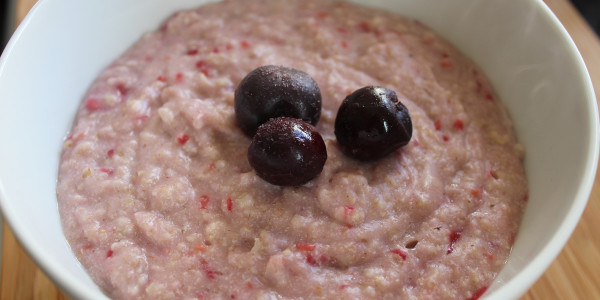Being able to provide a solid answer to our clients’ questions like “what should I eat after an early morning bootcamp?” can really help a client out practically and with a bit of training/nutrition integration knowledge.
“So what should I eat after an early morning bootcamp?”
Ok, here is a good chance to provide some solid basic info on the integration of training and nutrition so our clients can then choose a suitable post workout meal.
Protein is most definitely required post workout so that the body can start to repair the protein broken down during exercise and help us to maintain or gain lean muscle mass. Protein also helps keep us feeling full and satisfied.
Post workout is a good time to consume carbohydrates because a healthy body will tolerate carbs well at this time. This is due to an increase in insulin sensitivity and glucose transporter activity.(1)
However, if your client has a very high body fat percentage, and wants to maximise fat loss by reducing calorie intake, then carbohydrates can be reduced. If insulin sensitivity is very poor, carbohydrates will not be able to get into muscle cells effectively. The good news is that with regular exercise and reductions in body fat, the body will handle carbohydrates a lot better.(2)
The amount of carbohydrate required in a client’s diet will also vary depending on their daily activities. For example, an obese client wanting to lose weight, who sits behind a desk for 8 hours a day will not need as many carbohydrates as a relatively lean client who has a very active job and whose primary goal is building muscle.
There is also the matter of personal preference. Some people find that their appetites are kept under control very well by following a lower carb and higher fat approach, whereas some people prefer to eat less fat and consume more starchy carbohydrates. At the end of the day it’s about consuming the right level of calories, which support each client’s individual goals, whether that is through eating more fat and less carbohydrate or less fat and more carbohydrate. There is no one size fits all when it comes to diet.
One macronutrient that is vital for everyone to consume enough of is protein. A person’s need for protein increases with resistance training. That’s why protein is included in both meal examples below.
Here are some quick and easy recipe ideas:
HIGHER CARB:
Fruit & nut porridge with protein shake or boiled eggs. 60g porridge oats (ideally pre-soaked overnight to aid digestion), cooked over a medium heat for several minutes. Add 1 teaspoon stevia, spoon into a bowl and top with 1 diced kiwi, 15g flaked almonds and a handful of dried prunes. A couple of boiled egg whites or a protein shake (depending on time restraints).
Per Serving: 515 calories, 60g carbs, 35g protein, 15g fat
LOWER CARB:
Protein packed omelette. Melt half a teaspoon of ghee or butter in a frying pan. Add a handful of chopped vegetables (eg peppers, mushroom, spring onion) and cook until softened. Add 70g chopped cooked chicken breast and heat thoroughly. Remove everything from pan and set aside. Whisk 3 eggs in a jug, then pour into the pan (medium/high heat) ensuring an even coverage over the base of the pan. When the centre of the omelette starts to cook, spoon the meat and vegetables over half of the omelette and cook until the edges of the omelette start to crisp. Add 30g low fat cheddar cheese, fold the omelette and serve.
Per Serving: 492 calories, 9g carbs, 41g protein, 27g fat
NO TIME TO COOK? (LOW KCAL): Blend together a 30g scoop of vanilla or chocolate protein powder, 50g of frozen mixed berries, 10g ground flaxseed, a pinch of stevia, a splash of spring water and several ice cubes. Top up with water if the smoothie is too thick.
Per Serving: 188 calories, 8g carbs, 26g protein, 7g fat
Being able to offer your clients a recipe book packed with ideas is a great way to inspire them to eat well, plus it takes the strain off each individual client asking you what they should eat ????
1. Berardi, J., Andrews., R. The Essentials of Sport and Exercise Nutrition. 2012;148, 361.
2. Berardi, J., Andrews., R. The Essentials of Sport and Exercise Nutrition. 2012;348-9
